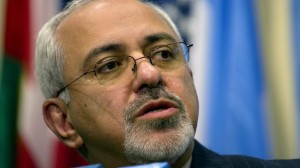 MUNICH, Germany � Israel must restore the rights of the Palestinians if it hopes to ever achieve peace, Iranian Foreign Minister Mohammad Zarif said at a security conference here on Sunday.
MUNICH, Germany � Israel must restore the rights of the Palestinians if it hopes to ever achieve peace, Iranian Foreign Minister Mohammad Zarif said at a security conference here on Sunday.�Of course we don�t make the same statement the previous government made,� he said, alluding to the bellicose tone of former president Mahmoud Ahmadinejad�s administration. �But [Israeli] policies have deprived the Palestinian people of the most elemental rights. Until this is discussed the crisis is not going away. Unless the rights of the Palestinian people are restored� there won�t be� a solution.�
Unlike the case at Iranian President Hassan Rouhani�s speech at the UN in September, the Israeli delegation remained in the room while Zarif spoke. However, he received a cool reception, as Defense Minister Moshe Ya�alon and Israeli Ambassador to the UN Ron Prosor stayed seated when Zarif shook hands with other delegates before taking the podium.
Israel has consistently criticized the international community for its policy vis-a-vis Iran�s disputed nuclear program and has accused Tehran of using the negotiations and an ensuing interim agreement as a stalling tactic in an attempt to develop nuclear weapons capabilities. Iran denies that its program is aimed at developing such capabilities.
Addressing ongoing negotiations with world powers, Zarif told the Munich Security Conference that�his country was prepared to move ahead, assuring Western diplomats that Tehran had the political will and good faith to reach a �balanced� long-term agreement.
He told a gathering of the world�s top diplomats and security officials that his country and Western nations were at a �historic crossroads� and just beginning to build the trust necessary for a long-term agreement.
�I think the opportunity is there, and I think we need to seize it,� he said.
The comments came after�Zarif met one-on-one�with US Secretary of State John Kerry on the sidelines of the conference Sunday morning.
Kerry reiterated to Zarif the importance of both sides negotiating in good faith, and of Iran abiding by its commitments, according to the State Department. The Iranian official described it as a �good meeting.�
Iran and the International Atomic Energy Agency struck a deal November 11 granting UN inspectors wider access to Iran�s nuclear facilities. The deal is parallel to an agreement reached with world powers November 24 in Geneva to have Iran halt its most sensitive uranium enrichment activities in return for an easing of Western sanctions over its nuclear program.
�That�s an important beginning; it�s not the end of the road,� Zarif said of the two deals. �There are important questions and we are prepared to address them.�
IAEA director general Yukiya Amano said he could report that �practical measures are being implemented as planned� by Iran, and that there would be new negotiations over the next phase on February 8.
Iran also has agreed to a new round of negotiations on February 18 in Vienna with a six-nation group of world powers: the five permanent members of the UN Security Council plus Germany.
�What I can promise is that we will go to those negotiations with the political will and good faith to reach an agreement, because it would be foolish for us to only bargain for six months � that would be [a] disaster for everybody,� Zarif said.
He said Iran and the international community needed to restore mutual trust, and averred that Tehran�s end goal was �a good solution � a balanced solution.� He added that �an unbalanced solution is inherently not stable.�
�Believe me, you do not possess the monopoly on mistrust � there is a lot of mistrust in Iran,� he told the audience. �Iranians believe, with good reason, that the West wants to deprive Iran of its ability to have access to technology.�
Zarif said that �the answer at the end of the day is you need to put aside all narratives and take concrete steps.�
Implemented January 20, the agreement with world powers will be in effect for six months while further negotiations are held aimed at reaching a permanent agreement eliminating concerns that Tehran might use its nuclear program to build nuclear weapons.
Tehran denies such aims but says it is ready to reach a deal in exchange for full sanctions relief.
Under the six-month deal, Iran has agreed to halt its 20 percent enrichment program, which produces uranium just steps away from military grade, but will continue enrichment up to 5%. It also will convert half of its stockpile of 20% enriched uranium to oxide, and dilute the remaining half to 5%.
In return, the US and the EU simultaneously announced the lifting of sanctions on petrochemical products, insurance, gold and other precious metals, passenger plane parts and services. They also plan to release $4.2 billion in Iranian assets of oil revenues blocked overseas, in eight installments over six months.
By The Times Of Israel
The Iran Project is not responsible for the content of quoted articles










